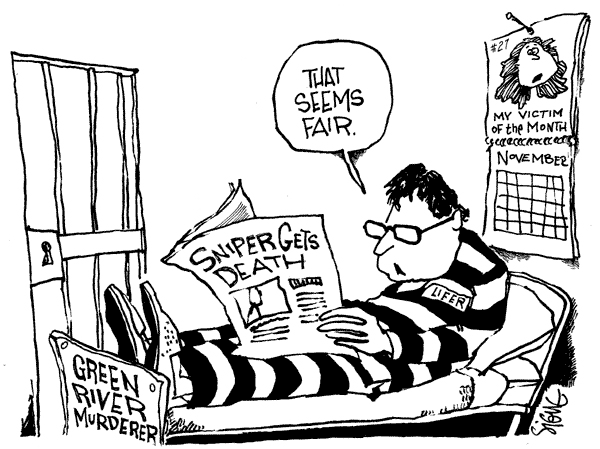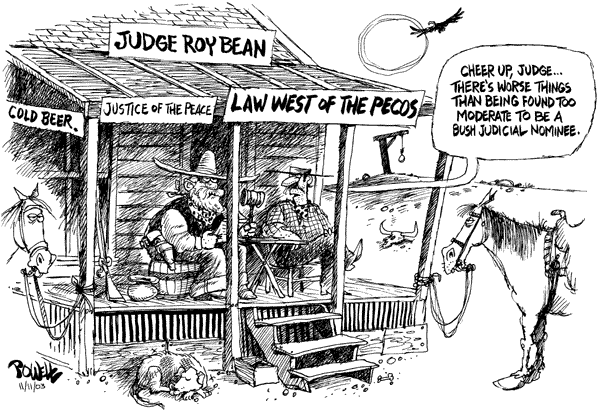An Absolutely Unbelievable and Unsupportable Decision
If the crime did not exist in the common law you are strictly liable for it even if you had absolutely no intent.
Esteban v. Commonwealth, No. 022524 (Va. 2003) ~~
Va. Code sec. 18.2-308.1(B).Those of you who have been reading this blawg for a while
will remember me confidently posting that this sort of thing could not happen under our system of law (4:15 a.m. 10 April 03 if the link doesn't take you to the exact post). Up to this case I believed it a basic part of due process under the 14th Amendment to require mens rea. And, at a gut level without researching actual case law, I still do. The Court's claim (1) that strict liability could be brought into all criminal charges which are codified by statute and (2) that it does not exist in those criminal laws which did not exist under the common law unless the Legislature specifically includes it is an anathema under our moral system and damn well ought to be under our jurisprudence.
This decision leads to absolutely insane consequences. Ordinarily one has to go pretty far to list a parade of horribles but in this case we need do little more than slightly alter the facts in the case at bar.
In this case the claim was that the lady forgot she had a gun in her bag when she brought it to school leading to her conviction as a felon. It is not too difficult a thing to imagine. It's bad enough that she becomes a felon for forgetting that she had a firearm in her bag but at least she should have known she had it. Under a sort of recklessness theory one still might find grounds for conviction (much as in manslaughter cases). However, as the Justice interpreted it, the gravamen of this statute is not any kind of mental state - not knowledge, nor intent, nor even implied knowledge.
The gravamen of this offense is
mere possession. One can foresee the case wherein a student who is scared during a locker inspection or just pissed at the teacher sticks a pistol in her bag when she is not looking. She carries her bag down the hall and opens it in the cafeteria to get money for lunch and there's a pistol sitting in it for the whole world to see. Even if you can prove the student's bad act, that teacher is still 100% guilty under this interpretation.
Stretching further, under this interpretation even necessity is not a defense. Let's suppose the teacher realized she had her pistol with her and locked it in the trunk of her car (which she parked off campus). Then two kids come into the school, shooting other kids, and looking for her. The teacher runs out to her car and in the ensuing gun battle takes cover in the school parking lot so she can hide behind the cars. She had a gun drawn on campus, ("displaying it in a threatening manner") with the intent to defend herself from mortal danger and under the statute that would require a 5 year mandatory prison sentence. Her intent to save her life is totally irrelevant.
But, you say, these cases would never go to trial because the prosecutor would exercise his discretion to not prosecute. To which I reply, in an adversarial system we should never have to rely on the benevolence of one adversary to ensure that the system operates correctly. Not that I think the prosecutors go out of their way to be unfair but they are human too, as capable of flaws and failings as the rest of us. Hopefully, prosecutors would not pursue a case in the scenarios above. However, lest we forget, under the facts as explained in the decision some prosecutor had to decide that it was a good idea to prosecute a teacher for forgetting about the gun and bringing it to school by accident.
Let's go back to the planted gun scenario. What happens if the prosecutor is up for election for three months from now, is in a tight race, and heavy political pressure is being put upon him to prosecute by a local church leader who is all over him for taking the side of a Catholic teacher over a Lutheran student (and 45% of his county are devout Lutherans)? What happens if the prosecutor is still holding a grudge from when the teacher's boyfriend beat him up in high school for asking her out? What happens if the prosecutor knows that this teacher's father and uncle are big time drug distributors and assumes the gun is hers because she must be in the business too (no matter what the kid - a small time dealer with ties to her uncle himself - says). Heck, what happens if the prosecutor just doesn't know whether the teacher had the gun planted on her or not and thinks he should prosecute if he is unsure?
What happens? She is convicted. Period. The Virginia Supreme Court has basically said she cannot defend herself once possession is shown. She has a permanent stain on her life for something she did not purposefully do and had no knowledge of doing. We are all (theoretically) stained for allowing such a thing to happen to her and we are all (already) stained for allowing such an interpretation under our system of "justice."








